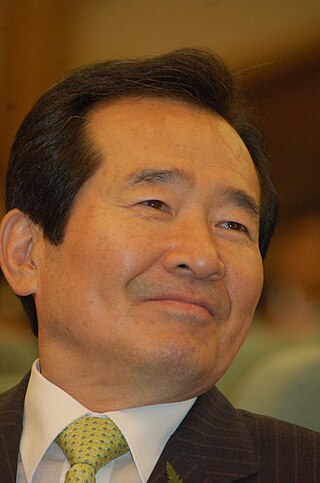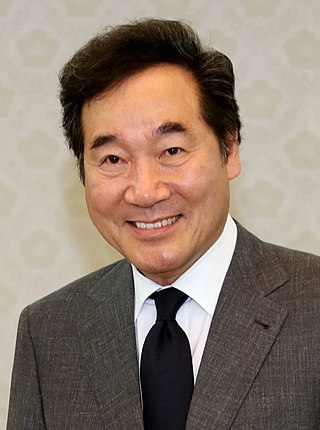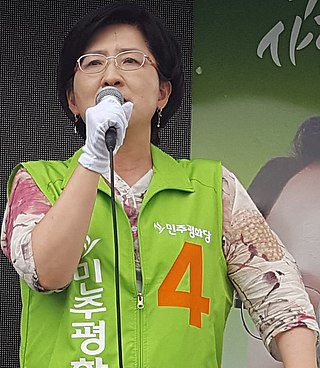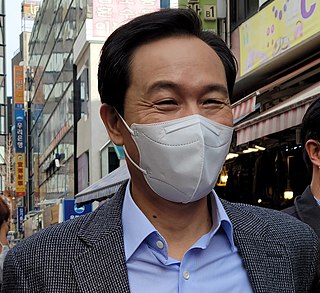
Kim Dae-jung was a South Korean politician and activist who served as the 8th president of South Korea from 1998 to 2003.
The Liberty Korea Party (Korean: 자유한국당) was a conservative political party in South Korea that was described variously as right-wing, right-wing populist, or far-right. Until February 2017, it was known as the Saenuri Party, and before that as the Hannara Party from 1997 to 2012, both of which are still colloquially used to refer to the party. The party formerly held a plurality of seats in the 20th Assembly before its ruling status was transferred to the Democratic Party of Korea on 27 December 2016, following the creation of the splinter Bareun Party by former Saenuri members who distanced themselves from President Park Geun-hye in the 2016 South Korean political scandal.

Presidential elections were held in South Korea on 19 December 2002. The result was a victory for Roh Moo-Hyun of the ruling Millennium Democratic Party, who defeated Lee Hoi-chang of the Grand National Party by just over half a million votes.

Roh Moo-hyun was a South Korean politician and lawyer who served as the ninth president of South Korea between 2003 and 2008.

Legislative elections were held in South Korea on 11 April 2012. The election was won by the ruling Saenuri or New Frontier Party, which renewed its majority in the National Assembly, despite losing seats. The election was read as a bellwether for the presidential election to be held later in the year. The result confounded exit polls and media analysis, which had predicted a closer outcome.

Presidential elections were held in South Korea on 19 December 2012. They were the sixth presidential elections since democratization and the establishment of the Sixth Republic, and were held under a first-past-the-post system, in which there was a single round of voting and the candidate receiving the highest number of votes was elected. Under the South Korean constitution, a president is restricted to a single five-year term in office. The term of the then incumbent president Lee Myung-bak ended on 24 February 2013. According to the Korea Times, 30.7 million people voted with turnout at 75.8%. Park Geun-hye of the Saenuri party was elected the first female South Korean president with 51.6% of the vote opposed to 48.0% for her opponent Moon Jae-in. Park's share of the vote was the highest won by any candidate since the beginning of free and fair direct elections in 1987 and the first such election in which any candidate won a majority. Moreover, as of the 2022 election, this is the latest South Korean presidential election in which the winning candidate won an absolute majority of the vote.

Early presidential elections were held in South Korea on 9 May 2017 following the impeachment and removal of Park Geun-hye. The elections were conducted in a single round, on a first-past-the-post basis, and had originally been scheduled for 20 December 2017. However, they were brought forward after the decision of the Constitutional Court on 10 March 2017 to uphold the National Assembly's impeachment of Park. Following procedures set out in the Constitution of South Korea, Prime Minister Hwang Kyo-ahn succeeded Park as the acting president. After Park was removed from office by the Constitutional Court's ruling, acting president Hwang announced he would not run for a term in his own right.

Legislative elections were held in South Korea on 13 April 2016. All 300 members of the National Assembly were elected, 253 from first-past-the-post constituencies and 47 from proportional party lists. The election was an upset victory for the liberal Democratic Party, which defied opinion polling by winning a plurality of seats in the election and defeating the ruling conservative Saenuri Party by one seat. In votes for party lists, however, Democratic Party came third, behind the Saenuri Party in first place and the new People Party in second.

Jung Hong-won is a South Korean politician, who served as the Prime Minister of South Korea from 2013 until 2015 under conservative President Park Geun-hye. Jung is also a former member of the Saenuri Party.

Lee In-je is a South Korean politician and a former judge.
The 7.30 by-elections were held in South Korea on 30 July 2014. 15 seats to the National Assembly of South Korea were contested while re-election occurred for 1 seat to the Municipal Council of Suwon.

Chung Sye-kyun is a South Korean politician who has served as Speaker of the National Assembly from 2016 to 2018 and Prime Minister of South Korea from 2020 to 2021.

The impeachment of Park Geun-hye, President of South Korea, was the culmination of a political scandal involving interventions to the presidency from her aide, Choi Soon-sil. The impeachment vote took place on 9 December 2016, with 234 members of the 300-member National Assembly voting in favour of the impeachment and temporary suspension of Park Geun-hye's presidential powers and duties. This exceeded the required two-thirds threshold in the National Assembly and, although the vote was by secret ballot, the results indicated that more than half of the 128 lawmakers in Park's party Saenuri had supported her impeachment. Thus, Hwang Kyo-ahn, then Prime Minister of South Korea, became Acting President while the Constitutional Court of Korea was due to determine whether to accept the impeachment. The court upheld the impeachment in a unanimous 8–0 decision on 10 March 2017, removing Park from office. The regularly scheduled presidential election was advanced to 9 May 2017, and Moon Jae-in, former leader of the Democratic Party, was elected as Park's permanent successor.

Lee Nak-yon, also known as Lee Nak-yeon, is a South Korean politician who served as the 41st Prime Minister of South Korea from 2017 to 2020. A member of the New Reform Party, he is the longest-serving prime minister since the Constitution of South Korea was last revised in 1987. Lee previously held the governorship of South Jeolla Province province from 2014 to 2017, a stronghold of his party. Before serving as governor, he worked as a journalist for over 20 years and served as a member of the National Assembly for four terms.
The Saenuri Party held a leadership election on 9 August 2016. The election was to elect a new party leader after the 2016 legislative election defeat.
Chung Woon-chun is a South Korean farmer, businessman and politician who served as one of co-Presidents of the defunct New Conservative Party. He was also a Member of National Assembly for Jeonju 2nd constituency from 2016 to 2020. He was one of rare conservative MPs in Honam. Prior to his MP career, he briefly served as the Minister of Agriculture, Fishery, and Food under the President Lee Myung-bak.

Park Joo-hyun is a South Korean lawyer and politician. She is the incumbent Member of the National Assembly since 2016 and was also one of the co-Presidents of the Minsaeng Party in 2020, serving with Yu Sung-yup.

Jeon Hae-cheol is a South Korean lawyer and politician who served as the Minister of the Interior and Safety from 2020 to 2022. He formerly served as the Senior Secretary to the President for Civil Affairs from 2006 to 2007, under the then President Roh Moo-hyun.

Woo Sang-ho is a South Korean activist and politician who served as the interim President of the Democratic Party from 7 June 2022 to 29 August 2022. He previously served as the parliamentary leader of the party from 2016 to 2017. He has been the Member of the National Assembly for Seodaemun A constituency from 2004 to 2008, and since 2012.

Chung Jin-suk is a South Korean journalist, activist, and politician who briefly served as the interim President of the Saenuri Party from 11 May 2016 to 1 June 2016. He has been the Member of the National Assembly for Gongju-Buyeo-Cheongyang since 2016 and was previously MP for Gongju-Yeongi from 2000 to 2004, and again from 2005 to 2008. He was the Senior Secretary to the President for Political Affairs in the Lee Myung-bak government from 2010 to 2011.















